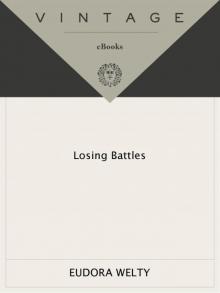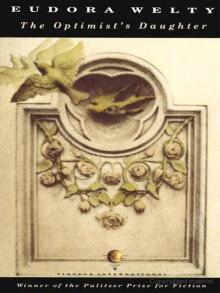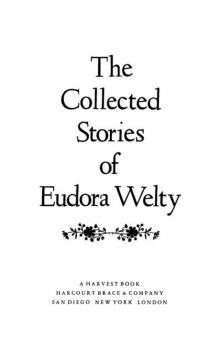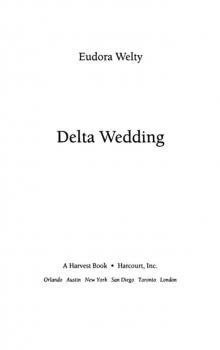- Home
- Eudora Welty
Delta Wedding Page 3
Delta Wedding Read online
Page 3
"Why did they let the Yellow Dog almost run over them?" Laura made her way to the table and leaned on it to ask Orrin, who answered her gravely, with his finger in his place in the book. "Here's the way it was—" For all of them told happenings like narrations, chronological and careful, as if the ear of the world listened and wished to know surely.
"The whole family but Papa and Mama, and ten or twenty Negroes with us, went fishing in Drowning Lake. It will be two weeks ago Sunday. And so coming home we walked the track. We were tired—we were singing. On the trestle Maureen danced and caught her foot. I've done that, but I know how to get loose. Uncle George kneeled down and went to work on Maureen's foot, and the train came. He hadn't got Maureen's foot loose, so he didn't jump either. The rest of us did jump, and the Dog stopped just before it hit them and ground them all to pieces."
Uncle Battle looked at Dabney with a kind of outraged puffing of his sunburned cheeks, a glare in her direction like some fatherly malediction; whether it was meant for Dabney herself in front of his eyes, or for what he had heard, Laura could not tell. And as if glaring itself made him nervous he dandled the ragged doll heavily on his knee.
Dabney gave a half-smile. "The engineer looked out the window—he said he was sorry."
Laura looked at her gravely. "I'm glad I wasn't there," she told her.
Then Aunt Ellen came in, meditatively, as the hall clock finished striking two which meant it was eight. She had a feather on her skirt—had she been out for her precious guinea eggs? She was a slight, almost delicate lady, seeming exactly strong enough for what was needed of her life. She was scarcely taller than Orrin, and Dabney and Shelley had been both taller and bigger than their mother for two years. She walked into the roomful of family without immediately telling them anything. She was more restful than the Fairchilds. Her brown hair and her dark-blue eyes seemed part of her quietness—like the colors of water, reflective. Her Virginia voice, while no softer or lighter than theirs, was a less questioning, a never teasing one. It was a voice to speak to the one child or the one man her eyes would go to. They all watched her with soft eyes, but distractedly.
She was one of those little mothers that the wind seems almost to hurt, and they knew they needed to look after her. She held very straight in her back, like a little boy who can do right in dancing class. And while she meditated, she hurried—how she hurried! She was never slow—she was either still or darting. They said she had no need for hurry with a houseful of Negroes to do the first thing she told them. But she did not wait for them or anybody to wait on her. "Your mother is killing herself," Battle's sisters told the children. "But you can't do a thing in the world with her," they answered. "We're going to have to whip her or kill her before she'll lie down in the afternoons, even." They spoke of killing and whipping in the exasperation and helplessness of much love. Laura could see as far as that she was the opposite of a Fairchild, and that was a stopping point. Aunt Ellen would be seen busy in a room, where Aunt Tempe for instance was never seen except proceeding down halls, or seated. She never cared how she dressed any more than a child. Aunt Tempe said to India last summer, in the voice in which she always spoke to little girls, as if everything were a severe revelation, "When your mother goes to Greenwood she simply goes to the closet and says, 'Clothes, I'm going to Greenwood, anything that wants to go along, get on my back.' She has never learned what is reprehensible and what is not, in the Delta." She was often a little confused about her keys, and sometimes would ask Dabney, "What was I going for?" "Why am I here?" When she threw her head back dramatically, it meant she was listening for a baby. Her small sweetly shaped nose was sparingly freckled like a little girl's, like India's in summer. Sometimes, as when now she stood still for a moment in the room full of talking people, an unaccountable rosiness would jump into her cheeks and a look of merriment would make her eyes grow wide. Down low over the dinner table hung a lamp with a rectangular shade of tinted glass, like a lighted shoe-box toy, a "choo-choo boat" with its colored paper windows. In its light she would look over the room, at the youngest ones intertwining on the rug and hating so the approach of night, the older ones leaning across the cleared table, chasing each other in a circle, or reading, or lost to themselves on the flimsy settee; Battle pondering in his way or fuming, while from time to time the voices of the girls called out to the telephone would sound somewhere in the air like the twittering of birds—and it would be as if she had never before seen anything at all of this room with the big breasting china closets and the fruit and cake plates around the rail, had never watered the plants in the window, or encountered till now these absorbed, intent people—ever before in her life, Laura thought. At that moment a whisper might have said Look! to her, and the dining-room curtains might have traveled back on their rings, and there they were. Even some unused love seemed to Laura to be in Aunt Ellen's eyes when she gazed, after supper, at her own family. Could she get it? Laura's heart pounded. But the baby had dreams and soon she would cry out on the upper floor, and Aunt Ellen listening would run straight to her, calling to her on the way, and forgetting everything in this room.
II
How Ellen loved their wide and towering foreheads, their hairlines on the fresh skin silver as the edge of a peach, clean as a pencil line, dipping to a perfect widow's peak in every child she had. Their cheeks were wide and their chins narrow but pressed a little forward—lips caught, then parted, as if in constant expectation—so that their faces looked sturdy and resolute, unrevealing, from the side, but tender and heart-shaped from the front. Their coloring—their fair hair and their soot-dark, high eyebrows and shadowy lashes, the long eyes, of gray that seemed more luminous, more observant and more passionate than blue—moved her deeply and freshly in each child. Dear Orrin, talking so seriously now, the dignity in his look! And little Ranny with his burning cheeks and the silver bleach of summer on his hair, so deliberately wielding the fan over his sisters! She had never had a child to take after herself and would be as astonished as Battle now to see her own ways or looks dominant, a blue-eyed, dark-haired, small-boned baby lying in her arms. All the mystery of looks moved her, for she was with child once more.
In the men grown, in Battle and George, it was a paradoxical thing, the fineness and tenderness with the bulk and weight of their big bodies. All the Fairchild men (the old-maid sister, Jim Allen, would recite that like a bit of catechism) were six feet tall by the time they were sixteen and weighed two hundred pounds by the time they were forty. But Battle weighed two hundred and fifty, and groaned to be gentle as he was; and George, though he was not himself fat, was markedly bigger and fairer than any of them in the early portraits, as if he were not a throwback to the type (which had faltered but little, after all, through marriages with little women like her, like Laura Allen and Mary Shannon before her) but a new original—a sport of the tree itself. She guessed she apprehended everything through the way they looked and felt—George sometimes more than Battle. Battle wore the glower of fatherhood or its little undermask of helplessness, that George had not put on. And George had remained left-handed, the thing they all inherited, as was somehow visibly apparent not just momently but always—perhaps by such a thing as the part in his hair. Her secret tremor at Battle's determined breaking of her children's left-handedness made her cherish it like a failing in George.
The fineness in her men called to mind their unwieldiness, and the other way round, in a way infinitely endearing to her. The fineness could so soon look delicate—nobody could get tireder, fall sicker and more quickly so, than her men. She thought yet of the other brother Denis who was dead in France as holding this look; from the grave he gave her that look, partly of hurt: "How could I have been brought like this?" as Battle cried in the Far Field when his horse, unaccountably terrified at the old Yellow Dog one day, threw him and left him unable to raise himself from the ditch.
"Oh, it was cloudy, or we would have remembered it was time for the Dog," Orrin was saying, looking up from his book.
"We wouldn't have made that mistake another day, when we could see the sun."
"The Dog was most likely running an hour late, and it wouldn't have done us any good." Dabney smiled. She twisted her foot in Shelley's hair, where they were lying together on the settee. "I'm making a hole in your net with my big toe."
"I won't lie here with you any longer," Shelley said languidly. But she did not move, or close her eyes fully. She looked rather dreamily down the slope of her own body, middy blouse, skirt, dark-blue stockings, and up Dabney's, light-blue stockings, light-blue swiss dress with one lace panel momently floating in Ranny's breeze, and Dabney's just-washed hair flying on her clasped hands behind her head. Dabney's face was suffused and soft now as Bluet's when she was waked from her nap. Her eyes seemed to swim in some essence not tears, but as bright—an essence that made the pupils large. The sisters looked now into each other's eyes, and as if there was no help for it, a flare leaped between them....
There was a lusty cry from Maureen.
"She's caught the cricket. She's pulling his wings off—she'll kill the cricket." Roy was on his feet.
"Don't stop her, don't stop her. Let her have her way," Battle said, his voice rumbling in Ellen's ears.
"The cricket minded, I think," Ranny said, holding the fan still.
"Come help me make a cake before bedtime, Laura," said Ellen; now she saw Laura with forgetful eyes fastened on her. She's the poor little old thing, she thought. When a man alone has to look after a little girl, how in even eight months she will get long-legged and skinny. She will as like as not need to have glasses when school starts. He doesn't cut her hair, or he will cut it too short. How sharp her elbows are—Maureen looks like a cherub beside her—the difference just in their elbows!
"I'll be glad to, Aunt Ellen," Laura said, and put her hand in hers as if she were Ranny's age. She came along in a toiling little walk.
"Get out of the kitchen, Roxie. We want to make Mr. George and Miss Robbie a cake. They're coming tomorrow."
"You loves them" said Roxie. "You're fixin' to ask me to grate you a coconut, not get out."
"Yes, I am. Grate me the coconut." Ellen smiled. "I got fourteen guinea eggs this evening, and that's a sign I ought to make it, Roxie."
"Take 'em all: guineas," said Roxie belittlingly.
"Well, you get the oven hot." Ellen tied her apron back on. "You can grate me the coconut, and a lemon while you're at it, and blanch me the almonds. I'm going to let Laura pound me the almonds in the mortar and pestle."
"Is that very hard?" asked Laura, running out for a drink at the water cooler.
Ellen was breaking and separating the fourteen eggs. "Yes, I do want coconut," she murmured. For Ellen's hope for Dabney, that had to lie in something, some secret nest, lay in George's happiness. He had married "beneath" him too, in Tempe's unvarying word. When he got home from the war he married, in the middle of one spring night, little Robbie Reid, Old Man Swanson's granddaughter, who had grown up in the town of Fairchild's to work in Fairchild's Store.
She beat the egg whites and began creaming the sugar and butter, and saying a word from time to time to Laura who hung on the table and watched her, she felt busily consoled for the loss of Dabney to Troy Flavin by the happiness of George lost to Robbie. She remembered, as if she vigorously worked the memory up out of the mixture, a picnic at the Grove—the old place—an exuberant night in the spring before—it was not long after the death of Annie Laurie down in Jackson. Robbie had tantalizingly let herself be chased and had jumped in the river with George in after her, everybody screaming from where they lay. Dalliance, pure play, George was after that night—he was enchanted with his wife, he made it plain then. They were in moonlight. With great splashing he took her dress and petticoat off in the water, flung them out on the willow bushes, and carried her up screaming in her very teddies, her lost ribbon in his teeth, and the shining water running down her kicking legs and flying off her heels as she screamed and buried her face in his chest, laughing too, proud too.
The sisters'—Jim Allen's and Primrose's—garden ran right down to the water there—how could they have known their brother George would some day carry a dripping girl out of the river and fling her down thrashing and laughing on a bed of their darling sweet peas, pulling vines and all down on her? George flung himself down by her too and threw his wet arm out and drew her onto his fast-breathing chest. They lay there smiling and worn out, but twined together—appealing, shining in moonlight, and almost—somehow—threatening, Ellen felt. They were so boldly happy, with Dabney and Shelley there, with Primrose and Jim Allen trembling for their sweet peas if not daring to think of George's life risked, and India seizing the opportunity of running up and sprinkling them with pomegranate flowers and handfuls of grass to tickle them. Dabney had brought young Dickie Boy Featherstone along that night; they had sat timidly holding hands on the river bank, Dabney with a clover chain circling and festooning her like a net. They had chided Robbie, she had endangered George—he could not swim well for a wound of war. But no one can stare back more languorously and alluringly than a rescued woman, Ellen believed, from the memory of Robbie's slumbrous eyes and surfeited little smile as she lay on George's wet arm. George was delighted as by some passing transformation in her, speaking some word to her and making her look away toward them overcome with merriment—as if she had beguiled him in some obvious way he found absurd and endearing—as if she had tried to arouse his jealousy, for instance, by flirting with another man.
As Ellen put in the nutmeg and the grated lemon rind she diligently assumed George's happiness, seeing it in the Fairchild aspects of exuberance and satiety; if it was unabashed, it was the best part true. But—adding the milk, the egg whites, the flour, carefully and alternately as Mashula's recipe said—she could be diligent and still not wholly sure—never wholly. She loved George too dearly herself to seek her knowledge of him through the family attitude, keen and subtle as that was—just as she loved Dabney too much to see her prospect without its risk, now family-deplored, around it, the happiness covered with danger. "Look who Robbie Reid is!" they had said once, and now, "Who is Troy Flavin?" Indeed, who was Troy Flavin, beyond being the Fairchild overseer? Nobody knew. Only that he had a little mother in the hills. It was killing Battle; she heard him now, calling, "Dabney, Dabney! Dickie Boy Featherstone's blowing his horn!" and at the telephone Dabney was talking softly to Troy, "I'm with Dickie Boy Featherstone, gone to Glen Alan.... Good night.... Good night ... It seemed to Ellen that it was for every one of them that added care pressed her heart on these late summer nights ("Now you can taste, Laura," she said), care that stirred in her and that she herself shielded, like the child she carried.
"Now, Laura. Go get that little bottle of rose water off the top shelf in the pantry. Climb where Roy climbs for the cooky jar and you'll reach it.... Now be putting in a little rose water as you go. Pound good."
She poured her cake out in four layer pans and set the first two in the oven, gently shutting the door. "Be ready, Laura, when I call you. Oh, save me twenty-four perfect halves—to go on top...."
She began with the rest of the eggs to make the filling; she would just trust that Laura's paste would do, and make the icing thick on top with the perfect almonds over it close enough to touch.
"Smell my cake?" she challenged, as Dabney appeared radiant at the pantry door, then coming through, spreading her pink dress to let her mother see her. Ellen turned a little dizzily. Was the cake going to turn out all right? She was always nervous about her cakes. And for George she did want it to be nice—he was so appreciative. "Don't pound your poor finger, Laura."
"I wasn't going to, Aunt Ellen."
"Oh, Mother, am I beautiful—tonight?" Dabney asked urgently, almost painfully, as though she would run if she heard the answer.
Laura laid down the noisy pestle. Her lips parted. Dabney rushed across the kitchen and threw her arms tightly around her mother and clung to her.
Roxie, waiting on th
e porch, could be heard laughing, two high gentle notes out in the dark.
From an upper window India's voice came out on the soft air, chanting,
Star light,
Star bright,
First star I've seen tonight,
I wish I may, I wish I might
Have the wish I wish tonight.
For a moment longer they all held still; India was wishing.
2
It was the next afternoon. Dabney came down the stairs vaguely in time to the song Mary Lamar Mackey was rippling out in the music room—"Drink to Me Only with Thine Eyes." "Oh, I'm a wreck," she sighed absently.
"Did you have your breakfast? Then run on to your aunts," said her mother, pausing in the hall below, pointing a silver dinner knife at her. "You're a girl engaged to be married and your aunts want to see you." "Your aunts" always referred to the two old-maid sisters of her father's who lived at the Grove, the old place on the river, Aunt Primrose and Aunt Jim Allen, and not to Aunt Tempe who had married Uncle Pinck, or Aunt Rowena or Aunt Annie Laurie who were dead. "I've got all the Negroes your papa could spare me up here on the silver and those miserable chandelier prisms—I don't want you underfoot, even."
"They saw me that Sunday they came up to dinner," said Dabney, still on the stairs.
"But you weren't engaged that Sunday—or you hadn't told."
A veil came over Dabney's eyes—a sort of pleased mournfulness.
"They'll ask me ten thousand questions."
"Let me go!" said India quickly. She was sitting on the bottom step finishing a leaf hat. "I'm not really busy."
"Come on, then," said Dabney. She ran down and leaned over her little sister and smiled at her for what seemed the first time in years.
"I can come! I'll hop!" Bluet instantly came hopping up with one shoe off, her sunny hair flying. In the corner Roxie's little Sudie, who was "watching" her, stretched meek on the floor with chin in hand. Little Battle tore through the house but didn't stop a minute, except to spank Dabney hard. Mary Lamar Mackey dreamily called, "Where are you all going?"

 On Writing
On Writing Losing Battles
Losing Battles The Robber Bridegroom
The Robber Bridegroom The Optimist's Daughter
The Optimist's Daughter The Collected Stories of Eudora Welty
The Collected Stories of Eudora Welty Delta Wedding
Delta Wedding The Ponder Heart
The Ponder Heart